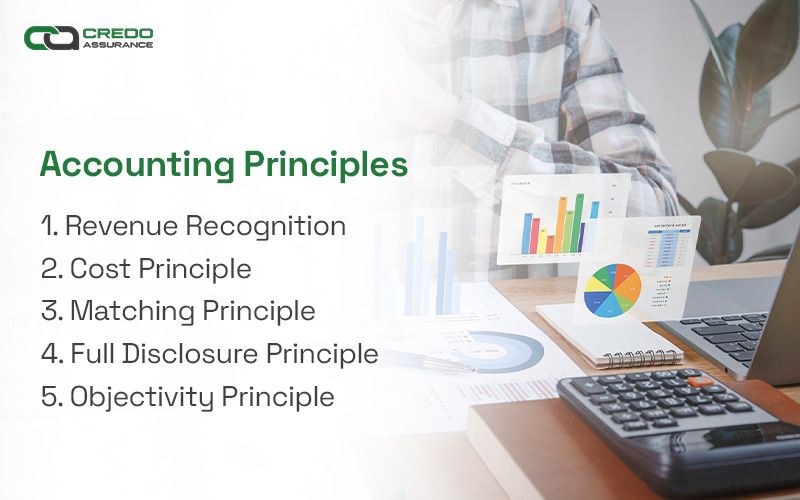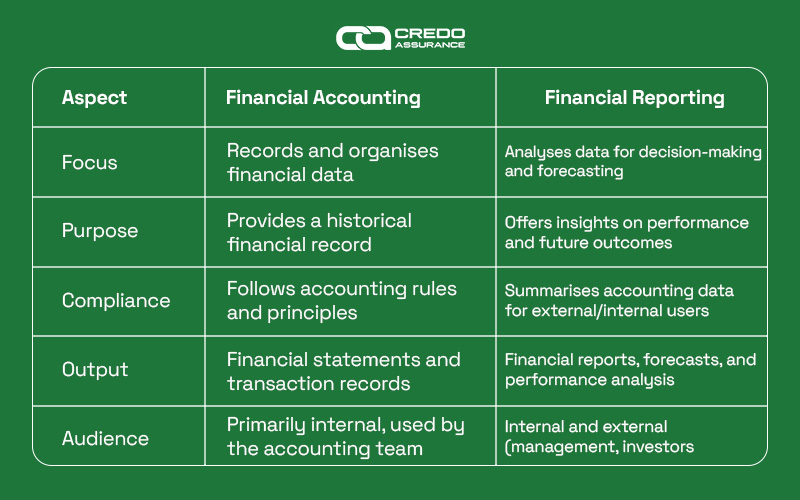Introduction
Many business owners and decision-makers often find themselves unclear about the relationship between financial accounting and reporting, as these terms are frequently used interchangeably. However, understanding the distinct roles accounting and reporting play is vital for effective financial management.
Financial accounting focuses on the systematic recording and summarisation of financial transactions, providing a solid foundation for tracking an organisation’s financial health. On the other hand, financial reporting takes this raw data and transforms it into comprehensive reports that cover the financial position of a business.
In this article, we will explore how financial accounting and reporting are interconnected, highlighting their significance in informing decisions, optimising operations, and ensuring long-term financial stability. Complementing an in-depth understanding of these accounting principles with dependable accounting services can help propel your business toward greater success.
Definition of Financial Accounting
Financial accounting is a systematic process that involves the collection, recording, and organisation of financial transactions within a business. In general, businesses engage accountants in Singapore to ensure these transactions precisely outline the company’s daily operations, including sales, expenses, and investments.
The primary purpose of financial accounting is to produce accurate and reliable financial statements that reflect a business’ financial health. This data serves as the foundation for financial reporting, offering a historical perspective on a company’s financial activities. By capturing and organising this information, financial accounting helps business owners, managers, and other stakeholders track financial performance, assess stability, and make informed decisions about the future.
Financial accounting operates according to a set of universally accepted principles designed to ensure consistency, transparency, and accuracy in the recording and reporting of financial information. These principles form the backbone of dependable financial reporting, covering the following:

1. Revenue Recognition
The revenue recognition principle dictates that revenue should be recorded when it is earned, not necessarily when cash is received. This is crucial for businesses that may offer services or goods on credit. For instance, a company might recognise revenue at the point of sale or when a service is rendered, rather than when payment is made. This principle ensures that financial statements reflect the true earning power of a business, even if the corresponding cash inflows occur at a later date.
2. Cost Principle
Under the cost principle, expenses are recorded at the actual transaction cost. This means the amount paid for an asset or service is recognised in the financial records. This value is not adjusted for changes in market value or inflation.
Moreover, the cost of certain assets and services may be allocated over time, depending on their useful life. For example, if a business purchases equipment, the cost is recorded at the purchase price and then depreciated over its estimated useful life.
3. Matching Principle
The matching principle keeps expenses recorded in the same period as the revenues they help generate. This is important for accurately reflecting a business’s profitability within a given time frame. For instance, if a company incurs costs to manufacture products in a specific quarter, these costs are matched with the revenue generated from selling those products in the same period, regardless of when the cash flows occur.

4. Full Disclosure Principle
The full disclosure principle requires that all relevant financial information be disclosed to stakeholders, ensuring transparency and trust in the financial statements. This includes not only the company’s core financials but also any information that may have a material impact on the company’s financial position or future performance. Examples include contingent liabilities, changes in accounting policies, or any significant events that might affect the business’s operations.
5. Objectivity Principle
The objectivity principle asserts that financial data should be reported based on factual evidence, free from personal bias or influence. This principle determines the reliability and credibility of financial statements. Financial transactions are documented using verifiable data, such as receipts, invoices, and bank statements, to maintain objectivity.
Objectives of Financial Accounting
After understanding the core principles of financial accounting, we will now focus on its key objectives. These objectives guide the recording, processing, accounting and reporting of financial data, keeping the information presented reliable, consistent, and compliant with relevant standards.
1. Historical Tracking
One primary objective of financial accounting is to maintain a comprehensive record of all past financial transactions. This historical tracking details a company’s financial activities over time, offering valuable insights into its financial performance and trends.
With accurate recording of income, expenses, assets, liabilities, and equity, financial accounting allows businesses to assess their financial journey and identify patterns that may influence future decisions. Historical data also reflects a company’s financial position when seeking investment or credit.
2. Accuracy and Consistency
Accuracy and consistency contribute to the reliability of financial data. Financial accounting adheres to established accounting rules and practices, such as the Generally Accepted Accounting Principles (GAAP) or International Financial Reporting Standards (IFRS), to ensure accurate records across periods.
Maintaining consistency in the recording methods and procedures allows businesses to present financial statements in line with the company’s true economic reality. The consistency of accounting and reporting is vital for stakeholders who rely on the company’s financial data to make informed decisions.
3. Compliance
Compliance with accounting principles and standards is another core objective. These principles, which include revenue recognition, cost, and matching principles, guide businesses in preparing accurate and truthful financial records. Meeting compliance standards means fulfilling legal and regulatory requirements, which fosters transparency and trust in financial reporting.
4. Preparation for Reporting
Finally, financial accounting plays a part in collecting the data necessary for financial reporting and decision-making. The process ensures that all relevant transactions are captured and organised, easing the preparation of comprehensive financial reports later.
These reports, such as the income statement, balance sheet, and cash flow statement, provide stakeholders with a clear understanding of the company’s financial position, performance, and cash flows.
Key Financial Accounting Processes
Effective financial accounting relies on several key processes to capture and organise financial data. Explore the key steps supporting businesses in maintaining clear and reliable records:
1. Data Collection
The first step in financial accounting is data collection, which includes tracking all income, expenses, and transactions. Accounting firms may be entrusted to document details, including invoices, receipts, and other financial records. To ensure a smooth financial performance analysis, this data must be captured accurately, clearly outlining every financial activity.
2. General Ledger Management
Once financial transactions are recorded, they are entered into the general ledger. As the backbone of the accounting system, a general ledger is a centralised record that categorises and organises all financial data.
Each transaction is classified into appropriate accounts, such as assets, liabilities, equity, revenue, and expenses. This process properly tracks all financial activities for further analysis and reporting.

3. Statement Preparation
The final step in the financial accounting process is the preparation of core financial documents. These include the income statement, balance sheet, and cash flow statement. These documents summarise the company’s financial performance, position, and cash movements over a specific period, providing valuable insights for management, investors, and other stakeholders.
The Principle of Financial Reporting
Definition of Financial Reporting
Financial reporting involves documenting and communicating a company’s financial performance over specific periods. Typically performed on a quarterly or yearly basis, the process analyses data from financial accounting and assesses the organisation’s current financial position. This data gathered is then used to prepare key financial statements.
Financial reporting not only helps internal stakeholders make informed strategic decisions but also enables external parties to evaluate the company’s financial stability and future outlook.
In this way, financial accounting and reporting work hand in hand, with accounting laying the foundation and reporting transforming this data into meaningful insights that guide decision-making and future planning.
Objectives of Financial Reporting
Having defined financial accounting and reporting, the next aspect to look into is the key objectives that guide financial reporting. The ultimate goal of financial reporting is to provide a clear, accurate, and comprehensive overview of a company’s financial health and performance. Below are its primary objectives:
1. Transparency
One key objective of financial reporting is to ensure transparency. During the process, businesses are to detail financial data in a structured and accessible manner. Stakeholders, such as investors, creditors, and regulatory bodies, will then use these reports to assess the business’ performance.
2. Forecasting
By analysing historical financial data, financial reporting helps predict future trends in revenue, expenses, and overall performance. This predictive capability is essential for businesses in planning and adjusting their strategies to maintain growth and stability.
3. Compliance
Financial reporting is also vital in ensuring compliance with legal and regulatory requirements. Public companies, for example, must adhere to guidelines set by regulatory bodies. Proper financial reporting keeps companies compliant with these standards, thereby avoiding penalties or legal complications.
4. Decision-making
Financial reporting is integral to stakeholder communication as it provides stakeholders with transparent and reliable insights into a company’s financial health and performance. As such, key parties, such as investors, creditors, suppliers, and regulatory bodies, can access detailed and accurate information necessary for evaluating the organisation’s stability, profitability, and growth potential.

In short, financial reporting fosters trust, supports informed decision-making, and strengthens relationships with stakeholders by aligning their expectations with the company’s objectives.
Core Financial Statements in Reporting
Core financial statements are indispensable tools in accounting and reporting, offering a structured overview of a company’s financial position and performance. These statements transform raw data from financial accounting into actionable insights, helping businesses evaluate operations and communicate effectively with stakeholders.
1. Income Statement
Also known as the Profit and Loss Statement, this report summarises revenue, expenses, and net income over a specific period, highlighting the company’s operational performance.
2. Balance Sheet
Offers a snapshot of a company’s financial position at a given point in time by detailing its assets, liabilities, and equity, showcasing overall financial stability.
3. Cash Flow Statement
This report categorises cash movements into operations, investing, and financing activities, offering a comprehensive view of how cash is generated and utilised.
4. Financial Dashboards
Primarily used for internal management, dashboards display real-time Key Performance Indicators (KPIs) and metrics, enabling quick decision-making and tracking progress against financial goals.
Key Differences Between Financial Accounting and Financial Reporting
Financial accounting and reporting are often interconnected but they serve distinct roles in business management. Together, these functions provide a comprehensive framework for effective financial management.
Financial accounting focuses on maintaining accurate and consistent records of a company’s financial transactions, supporting daily operations, internal reviews, and compliance.
Meanwhile, financial reporting uses this data to present a broader view of the company’s financial performance. The key is to help stakeholders make informed decisions, plan for future investments, and assess overall business health.

Questions You May Have
1. Can small businesses benefit from financial accounting and reporting?
Yes. By maintaining accurate financial records and producing regular reports, small business owners can gain insights into their financial health, identify trends, and make better-informed decisions to drive growth.
2. What role does technology play in financial accounting and reporting?
Technology plays a part in enhancing the efficiency and accuracy of financial accounting and reporting. Accounting software can automate data entry, generate financial statements, and provide real-time insights.
3. What is the role of auditors in financial accounting and reporting?
Auditors verify the accuracy and reliability of financial statements prepared through financial accounting. They conduct audits to ensure compliance with accounting standards and reassure stakeholders that the financial reports present a true and fair view of the company’s financial position.
Conclusion
Grasping the differences and synergies between financial accounting and reporting is beneficial. From maintaining transparency and making informed decisions to strengthening the financial foundation, these processes ensure long-term business success.
With expert financial support, high client satisfaction, and dependable expertise, Credo Assurance is here to help businesses unlock their full potential. Whether you need financial accounting advisory services or outsourcing accounting, our tailored solutions are designed to meet your unique needs.
Contact us to focus on achieving your goals while we handle the numbers.





